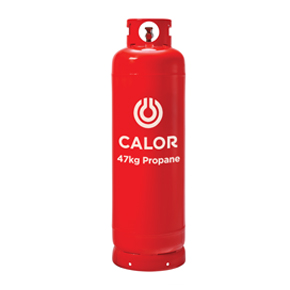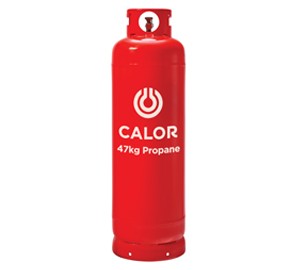Gas bottles
You may not have used portable gas bottles before unless you had a caravan or a boat.
Gas is the most common source of hot water and cooking here in Portugal.

A lot of people don’t like gas bottles, they are heavy 47 Kg or 13 Kg for a small one, people think that they may explode and they are ugly. They are also inconvenient when they run out.
The thing that I dislike the most is the time it takes to have a replacement full bottle delivered because you stand the risk of having no gas for a couple of days unless like me you have kept a small gas bottle in reserve.
Gas what sort of gas are we talking about ?
There are two types. Propane and Butane which are LPG or Liquid Petroleum Gas. Butane is the one used most commonly for homes.
In their natural state, LPG (Propane and Butane) and Natural Gas are all odorless. The distinctive gas smell that people associate with these gases is added to them as a safety measure.
Bottled gas safety.
Leaks. Fortunately you can usually smell a gas leak. Do not ignore it and make sure to turn off the gas at the bottle and remove the regulator.
The leaks usually come from the regulator vale that sits on top of the gas bottle. There deteriorate over time.
The connections to the hose from the regulator up to the gas appliance,
The gas hose its self.
If its black in colour renew it immediately. The hose should be white and have its replacement due date stamped on it. It should have the correct gas hose connections fitted not hose clips.
Gas bottles should be kept in a gas house with a ventilated door so they are safe from interference and shaded from the sun.
One cheery piece of information – Gas bottles even when full do not explode.
If in the event of a fire they are subject to direct and extreme heat the safety release valve will vent gas however so keep your bottles in a gas house.
For more detailed safty information on gas bottle fed appliances go to.
http://www.elgas.com.au/blog/503-home-gas-appliance-maintenance-lpg-natural-gas
Home gas appliances need to be regularly checked and have routine scheduled maintenance.
This is important to maintain proper function and safety.
Important for Safety & Saving Money
Having your gas appliance inspected and cleaned periodically by an authorised service technician will benefit performance, help ensure safe operation, minimise any potential down time and extend the life of your appliance.
Only use Qualified Personnel
It is important that your gas appliances are only service by qualified technicians.
In most cases, this means a licensed gas fitter or a factory technician.
Never attempt to fix a gas appliance yourself or allow an unqualified person to attempt to fix it for you.
- Service Frequency
Regular Home Gas Appliance Maintenance
Manufacturers typically recommend that their gas appliances be serviced every one or two years.
For example, both Rinnai and Bosch generally recommend 2 year service intervals while Rheem and Paloma recommend annual servicing.
You should always refer to your owner’s manual for the recommended maintenance schedule that is applicable to the make and model of appliance you own.
A ‘tune-up’ just before heating season is ideal.
- Read Your Owner’s Manual
It is very important that you understand the correct and safe operation of your gas appliances.
Improper use can result in safety hazards.
If you don’t have the owner’s manual, most gas appliance manufacturers have them available for downloading on their web sites.
If not, contact them directly to request a copy.
- Warning Signs
Yellow flames are a warning sign
Key warning signs that your gas appliance requires servicng are a yellow or red flame, a flame with a yellow burning tip, the accumulation of yellow/brown soot around the appliance, pilot lights that frequently blow out or an acrid smell and eye irritation.
The exceptions to this are gas fireplaces and gas log fires that are designed to have yellow flames.
The above signs may be indications of incomplete combustion.
The result is that you could be wasting gas and/or generating carbon monoxide.
The latter is a serious safety problem, if it occurs with an indoor appliance.
If you observe any of these warning signs, you should schedule a service ASAP.
- Burner Operation
The burner should be cleaned and checked for proper operation.
Burners blocked with dirt can result in improper combustion, leading to soot build up inside the appliance.
- Air Filters
Air filters and fans can become blocked by lint and dust. The result can be overheating and burner combustion problems.
Depending on the make and model of gas heater, you may be able to clean the air filter yourself.
Please consult your owner’s manual to see if this is recommended and how to do it.
Damaged flue
Flue pipes should be checked for damage, corrosion and blockages.
Holes, punctures or loose fitting joints require immediate attention.
If a flue needs servicing, call your licensed gas fitter to have it cleaned or repaired.
Gas Pressure
Part of the regular service should include the checking for correct gas pressure and adjusting, as required.
Incorrect gas pressure can affect the amount of oxygen drawn into the burner with the gas.
If this happens, it can cause improper combustion. Excessive pressure could also create a safety hazard.
Fluctuating Water Temperature
If you have a tankless continuous flow hot water heater and the temperature keeps fluctuating, you should call for a service.
It is normal for a gas hot water storage tank to experience a gradual temperature change, as you use up the available hot water.
Storage Tank Hot Water Heaters
Hot Water Pressure Relief Valve
These units have a Pressure Relief Valve.
This valve relieves excessive temperature or pressure build up that may occur inside the tank. It is normal for the valve to release a little water.
A continuous leakage of water from the valve and its drain may indicate a problem.
If you notice this valve frequently venting or continuously leaking, you should contact your plumber/gas fitter to check the entire water heater.
If you smell gas take the following gas safety precautions:
Turn off the gas at the source. At the meter for natural gas or at the cylinders for LPG gas users, but only if safe to do so. Avoid contact with any visible gas cylinder leak, as the gas stream can cause cold burns.
Extinguish all flames and do not smoke or strike matches.
Do not operate electrical switches or devices, including mobile telephones.
If the leak is inside of your home, open doors and windows to ventilate the area, but only if safe to do so.
Keep people away from the affected area until the gas dissipates.
Call your gas supplier or gas fitter, from a safe area, for repairs.
http://www.elgas.com.au/blog/352-how-to-prevent-bbq-gas-fires
This is a short sampler video comprised of excerpts from an online training module created by Chiltern Consulting Ltd, a leading Health & Safety consultancy. The training covers handling, transporting and changing of these cylinders. For more information call 01494 778499 or check out www.chilternconsulting.com.
https://www.calor.co.uk/gas-bottles/gas-cylinder-safety


